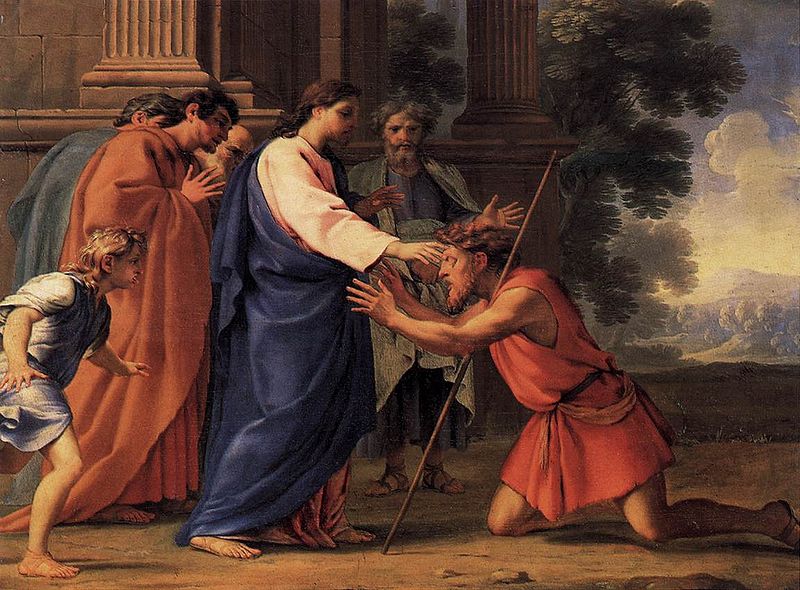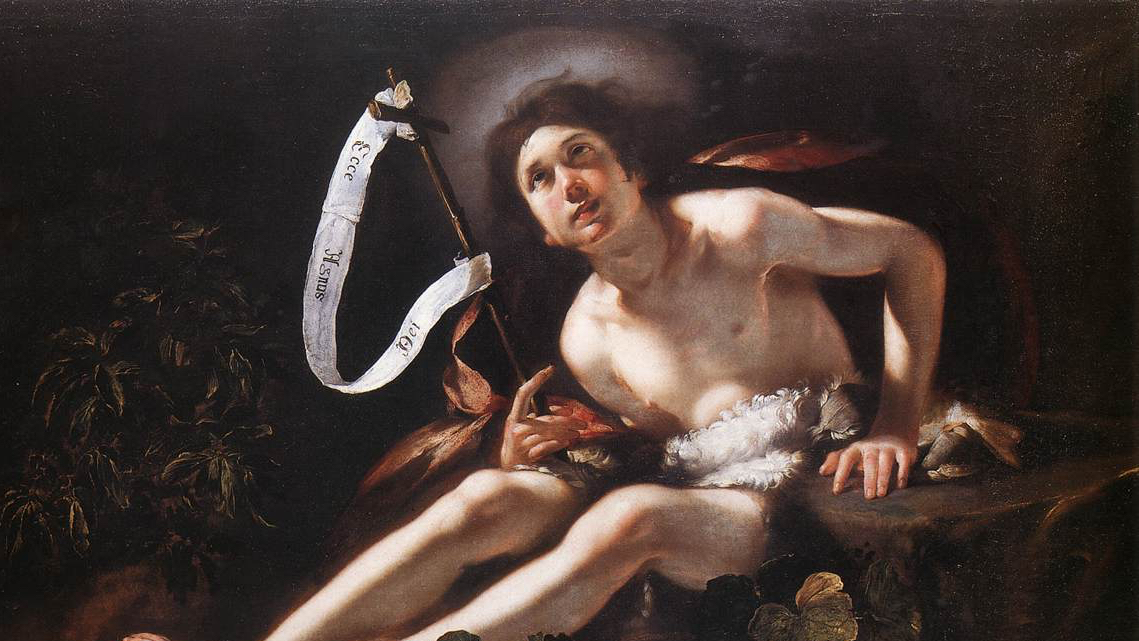
The Gospel verses for this fourth Sunday of Lent (Jn 9:1-41) have always been very special to me. Special because my mother was blind! But unlike the man in this Gospel passage, my mother was not blind from birth. My mother lost her eyesight to a medical condition when she was in her mid-thirties. The blood flow to her retinas was cut-off and her retinas slowly died. Sadly, if that condition were to occur today, her eyesight could be saved through laser surgery. But back in those days, there was nothing they could do. It took a few years but eventually she went totally blind.
During that interim period, while her vision slowly died, my mom and dad did as much traveling as they could afford, so that my mom could see as much of the world as possible. I was the youngest of four children, so as they traveled I was privileged to tag along with them. One of the many trips they took was to the Saint Anne de Beaupre Shrine in Quebec. This trip was very special for my mom. She spent many weeks, if not months, in prayerful preparation for that trip. Being aware of the many miraculous healings that have taken place there, she prayed that she too might be blessed and saved from this devastating loss. When we arrived there, I was impressed by the many crutches, wheel chairs and white canes that lined the walls in testimony to the many that had been cured there. The sight was impressive.
My mom knelt in humble prayer in that chapel, and my dad and I prayed with her. But sadly, nothing happened. There was no miraculous cure. Now you would think that after all that prayerful preparation and after all that longing, she would have expressed some disappointment. If she was disappointed, it was not obvious to me. She said, “Oh well. I guess it’s not God’s will. You just go on and roll with the punches.” We continued on with that trip, sightseeing and having a good time.
I used to marvel at my mom. Even though she was blind, she was, without a doubt, the most joyous person I have ever known. She loved life and she never let her blindness slow her down. Knowing my mother’s personality, I can just imagine the excitement and the thrill she would have experienced if she had been healed at Saint Anne de Beaupre. And I can just picture the effect she would have had on everyone around her by her display of excitement.
So, when I read this Gospel text, I find the story a little upsetting. I don’t understand the behavior of the Pharisees. Something phenomenal had just occurred. A man who was totally blind from birth had just received his sight. You can just imagine his elation. He had to be thrilled and excited. How could the Pharisees possibly be immune to that excitement? How could they even doubt the miracle that had just occurred! I just don’t understand their reaction. So I had to look deeper to try to understand. Just who were these Pharisees? What was their philosophy? What in their background would prompt that kind of behavior?
To answer that question, we simply have to look at history. In the middle of the second century, or about 142 B.C., the Jews finally won their freedom from their earlier oppressors. They saw this captivity as God’s punishment. The Jews believed that God had punished Israel for their failure to faithfully follow the Mosaic Law. They were determined to never allow that to happen again. Key leaders arose among them who concluded that the Israelite community must honor, and remain faithful to, the commandments of God; to ensure God’s blessings on their nation rather than experiencing His punishments again. This gave rise to a group of men known as the Pharisees. These were men who were dedicated to distancing themselves from the unrighteous in their pursuit and promotion of holiness. When the nation of Israel fell under Roman rule in 64 B.C., the reaction in the mind of the Pharisees was to presume that God was once again punishing their nation for its failure to follow the Law perfectly. They, therefore, became even more passionate in their drive toward strict observance of their religious Laws.
In the time of Jesus there were many Pharisees, probably several thousand. But within them were two main schools of philosophy. The first, the most important and most influential, was a group of ultra-conservative religious fundamentalists. They believed that the Jewish descendants of Abraham were the only people of value in God’s eyes. In their eyes, Gentile converts to Judaism were not welcome. They despised the Gentiles. They would not enter a Gentile dwelling. They would not eat with a Gentile. They wouldn’t even permit the purchase of food from a Gentile. And they held a legalistic view of the Sabbath as a day requiring absolute rest. The second group within the Pharisees was a little more liberal. They welcomed Gentile converts to Judaism. They recognized the required observance of the Sabbath day, but they felt that good deeds were permitted on the Sabbath. So attending to the needs of a sick person or healing on that day was permitted. You can see those two schools of thought expressed in today’s Gospel. Some Pharisees said, “This man is not from God because he does not keep the Sabbath.” But other Pharisees said, “How can a sinful man do such signs?” So there was division among the Pharisees.
I’m sure you’ve all heard of Helen Keller. She lost both her hearing and her eyesight when she was only 19 months old. Someone once asked her if blindness were the worst thing that could happen to a person. She answered that “The worst thing that could befall a person is not to lose their sight but to lose their vision.”
I once asked my mother a similar question. I said, “Blindness must be a terrible burden to you.” She said, “Losing your eyesight is a handicap no doubt. But that is not the worst thing that could happen to a person. Isolation is by far the worst thing. Isolation can be caused by either ones inability or their unwillingness to hear.”
That lack of vision, that unwillingness to hear, is demonstrated in this Gospel text. Did you notice, for example, that in the story, Jesus initiates the healing himself? The man didn’t request anything. Jesus simply chose him. Jesus chose to restore his sight. Why? Jesus said that it was simply so “That the works of God might be made visible through him.” But even after that phenomenal demonstration of the power of God, the Pharisees remained unmoved; isolated in their philosophical views.
Notice also that Jesus does not confront the Pharisees. Jesus does not focus on the controversy. He does not engage in any philosophical argument. And He does not focus on the man’s blindness, or the problems of life that would permit such a handicap. Rather, he simply took the opportunity to demonstrate the power of God.
Throughout the Gospels, Jesus does express His frustration with the Pharisees. He condemns them for their attitude of self-piety. And He condemns them for their assertion that they are sinless because of their strict observance of the Mosaic Law. The Pharisees were against Jesus from the start. Their philosophy and their prejudices blinded them from acknowledging the power of God that had just been demonstrated before their very eyes. Ultimately the Pharisees reject Jesus. They rejected Him for their theological differences. They rejected Him for His claiming to be God in the flesh. And they rejected Him simply out bitterness and envy.
This Gospel passage is a stark reminder for all of us who consider ourselves to be a follower of Christ. For we too can remain spiritually blind, oblivious to the miracle of life around us! The blind man was brought to faith when Jesus miraculously cured him of his physical affliction. The Pharisees, however, preferred to remain rooted in their traditions and they remained blind to the gift of faith that was being offered to them.
Our world today is filled with problems. You might have seen this past week’s issue of Newsweek Magazine. The headlines on the cover read, “Apocalypse now! Tsunamis, earthquakes, nuclear meltdowns, revolutions, economies on the brink! What the heck is next?” Hiding away from these difficulties of life does not follow the example of Jesus. Our natural human response to these and the other tragedies of life is fear. But did you know that the most frequently repeated phrase in scriptures is “Do not be afraid”! It appears over 360 times in the scriptures. The second most frequently repeated phrase in scripture is “Son of man” which appears nearly 200 times. It takes a courageous act of faith to be able to look beyond the problems of life and recognize the power of God that creates and sustains life.
The Gospel text ends on a sadly tragic note. Jesus said, “If you were blind, you would have no sin; but now you are saying ‘We see’ so your sin remains.” It is this willful refusal to see that Jesus condemns. Let us, therefore, pray for freedom from whatever it is that might prevent us from being able to recognize the many gifts of God. Let us pray for a faith that will brighten our vision, enabling us to see and recognize God’s presence in the midst of life. Let us pray for eyesight that will enable us to see Jesus in each and every face we meet and in every life we pass. [4th Sunday of Lent- A]






